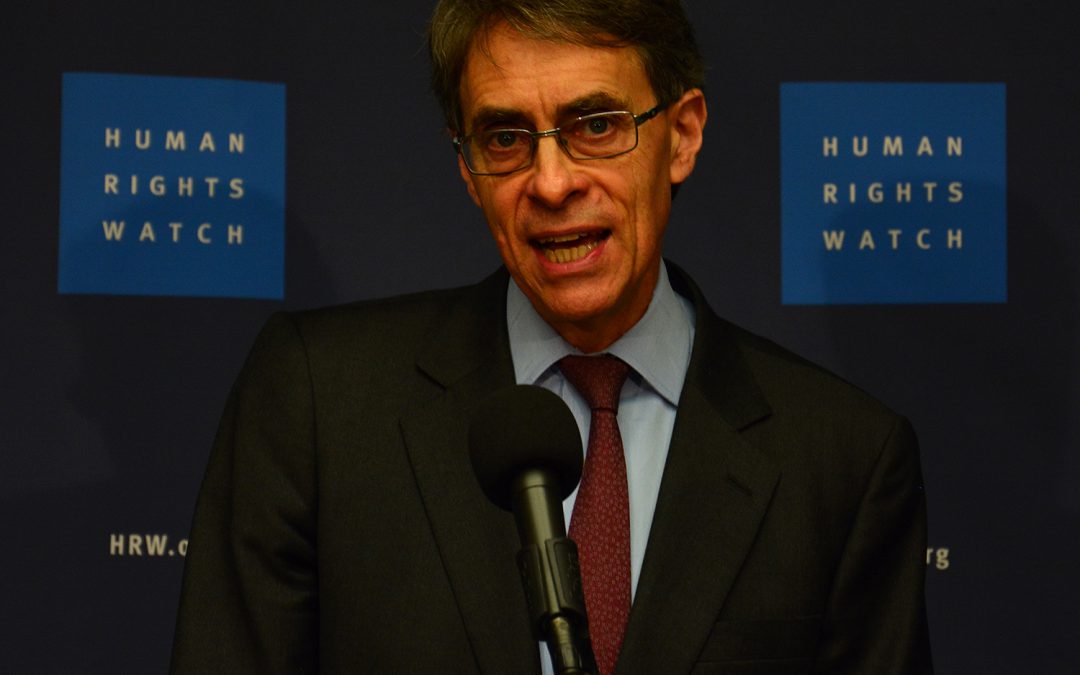WASHINGTON—Human Rights Watch warned about the rise of populist political movements around the world in an annual report issued Thursday and focused on the presidential campaign of Donald Trump as having “vividly illustrated” a trend toward the “politics of intolerance.”
The New York-based nonprofit organization cited human rights dangers in China, Russia, Syria and the Philippines in its 27th annual report, reviewing more than 90 countries.
The rise of populism in the United States and Europe will “reinforce and encourage” authoritarian leaders around the world, said Executive Director Kenneth Roth, speaking at a news conference at the National Press Club.
“Donald Trump’s successful presidential campaign vividly illustrated this politics of intolerance,” said Roth. “He spoke to many Americans discontent with economic stagnation and increasingly multicultural society in a way that breached basic principles of dignity and equality.”
Discontent with the status quo, especially among people who feel left behind by technological change and who are uneasy with racially and religiously diverse societies, has allowed politicians to flourish by “portraying human rights as protecting only the terrorist, or only the asylum seeker, at the expense of the welfare of and cultural preferences of the presumed majority,” Roth said.
The report cited other populist leaders, including President Rodrigo Duterte of the Philippines, who was elected last year after campaigning to “kill all of you who make the lives of Filipinos miserable.” He has publicly praised the extrajudicial killings of suspected drug dealers and users in the Philippines, where, the report said, police and unidentified gunmen killed thousands of people since Duterte took office last June. A September 2016 poll by Pulse Asia Research reported he had an 86 percent approval rating.
Trump and populist leaders gaining political power “pose an actual threat to the human rights system,” said Emma Daly, the organization’s communications director, in an interview. “He seems to be arguing that it’s OK to threaten the rights of a group of people—as long as the majority is OK with it, it’s OK.”
Human Rights Watch advocates for an American foreign policy rooted in civil rights and individual freedoms, said Roth. His group is concerned Trump’s presidency will result in a change in stated foreign policy priorities of democracy and human rights.
In the news conference he also expressed concern about Rex Tillerson, the former Exxon Mobil chief executive nominated by President-elect Trump to be Secretary of State. “This is a guy who has made his career by cutting deals with dictators,” Roth said. “And suddenly he’s supposed to be a statesman standing up for basic values of human rights and democracy. There is nothing in his decades of experience that suggests this is something he cares about.”
On the subject of Syria, Roth said Trump’s stated priority of destroying ISIS, and potentially allying with Russia and the Syrian regime to do so, won’t work.
“A lot of the reason ISIS is so strong today is because of [Syrian President Bashar] Assad’s atrocities, so if Trump is going to take the view that Assad’s atrocities are a secondary matter, that they’re not really an area of concern when it comes to attacking ISIS, we’re going to be in a much worse situation,” Roth said.
At the news conference, Roth spoke of French presidential candidate Marine Le Pen, who leads the right-wing National Front Party. She is campaigning on a nationalist, anti-EU, anti-immigrant platform. France’s presidential elections will take place in two stages on April 23 and May 7. The report criticizes Chinese leader Xi Jinping’s crackdown on dissent, and Russian President Vladimir Putin’s draconian restrictions on free speech and dissent.


